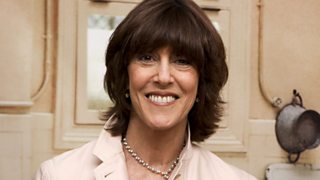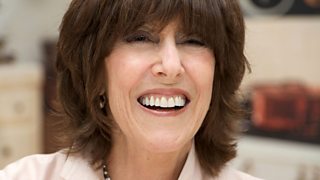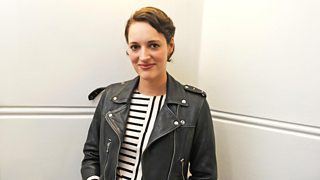Great things we've learnt from Nora Ephron
No matter how much you know about Nora Ephron, she’s probably had an impact on your life.
This is partly because Nora Ephron pioneered the portfolio career. She was a journalist, an essayist, a novelist, a screenwriter, a director and a blogger. Her writing remit was wide, but every single piece of work that she created is still making us laugh and making us think.
With her whipsmart and bittersweet novel about a marriage on the rocks, Heartburn, on Radio 4, we take a look at what are some of the great lessons we've learnt from Nora Ephron.

-
![]()
Heartburn
Nora Ephron's whipsmart and bittersweet novel about a marriage on the rocks. Read by Julianna Jennings.
“When you slip on a banana peel,” Nora Ephron liked to say, “people laugh at you. But when you tell people you slipped on a banana peel, it’s your laugh.”
Try to find the funny parts of pain
Nora Ephron is famous for coining the phrase “Everything is copy”, an expression that she said came from her own mother, the screenwriter Phoebe Ephron, who would use it to encourage her children to be philosophical about bad experiences and urge them to find the funny parts of pain. It worked. In 1983, after working as a journalist on The New York Post, Esquire and New York Magazine, and writing several screenplays (including the award winning Silkwood) Ephron published her first novel, Heartburn, an autobiographical story based on her marriage to and divorce from the writer Carl Bernstein.
It's human to mistake a false start for a happy ending
Heartburn teaches us three very important things – there is always comedy to be found in times of tragedy, that it’s very human to mistake a false start for a happy ending and that it is OK for smart women to believe in love, and to look for it, even when all the evidence seems to point to the contrary. She wrote “Sometimes I believe that love is essential, and sometimes I believe that the only reason love is essential is that otherwise you spend all your time looking for it.”
-
![]()
Great Lives: Nora Ephron
Journalist Eve Pollard explores Hollywood screenwriter Nora Ephron with Matthew Parris.
Be the hero of your own life, not the victim
Nora also taught us that even though the world seems to want women to be “nice”, honesty and authenticity are often much more valuable and useful. She graduated from Wellesley College in 1962 and wrote about how she felt that her experiences there did not prepare her for life in any meaningful way. In an essay for Esquire called Reunion, she wrote: “It always seemed so sad that a school that could have done so much for women put so much energy into the one area women should be educated out of…what do you think? What is your opinion? No-one ever asked.”
We can all control our lives by telling our own stories, choosing how we are perceived and what we want to believe about ourselves.
After giving her negative opinion on her old college, she was asked to deliver the commencement address in 1996, in which she urged the new graduates to: “Be the heroine of your own life, not the victim.” Most of all, she believed that we can all control our lives by telling our own stories, choosing how we are perceived and what we want to believe about ourselves. She felt that it was always better to make someone laugh than to make them feel pity.
Take challenges in your stride
Ephron wrote inspiring work, but she has also inspired many of her fans with the way she worked. She worked on her first screenplay in the mid-seventies but did not get a film made until Silkwood in 1983, and even though she had a huge success with When Harry Met Sally in 1989, she struggled to find studios who would finance her work. So she started directing too, making This Is Your Life in 1992 and having a big hit with Sleepless In Seattle in 1993 – a film no-one wanted to make until Ephron took it on and rewrote the script.
, she talked about how her work ethic allowed her to take these challenges in her stride. “Nobody really has an easy time getting a movie made,” she said. “And furthermore I can’t stand people complaining.”
Nora Ephron discusses her love of literature, what it's like to work closely with her sister and the inspiration for her book and film Heartburn.

She reveals her winning box-office formula and discusses the release of the movie You’ve Got Mail.
It's up to us all to find our own banana peel
Ephron’s words and ideas have influenced millions of us. She used comedy to open up discussions about female sexuality (), , and, in Heartburn, she wrote a funny, moving and beautiful novel that provides the readers .
Nora felt that it was always better to make someone laugh than to make them feel pity.
She made us want to be her – but ultimately, she taught us all to be ourselves. In her essay collection Crazy Salad, she included a profile piece titled Dorothy Parker. Ephron wrote: “All I wanted was to come to New York and be Dorothy Parker. The funny lady. The only lady at the table. The woman who made a living by her wit. Who always got off the perfect line at the perfect moment, who never went home and lay awake wondering what she ought to have said because she said exactly what she ought to have…I had come to grips with the fact that I would never be Dorothy Parker.” Many fans want to be Nora Ephron the way that Ephron wanted to be Dorothy Parker – but the lesson Ephron wanted to impart is that it’s up to us all to find our own banana peel - and we can all honour Nora’s memory by being our own heroines.
Listen to Nora Ephron's novel Heartburn - a whipsmart and bittersweet story about a marriage on the rocks. Read by Julianna Jennings.
-
![]()
Heartburn
Nora Ephron's whipsmart and bittersweet novel about a marriage on the rocks.
-
![]()
Nine secrets to improve your relationships
Practical tips for helping the important relationships in your life run smoothly.
-
![]()
Six kick-ass fictional female assassins
Favourite assassins from film, TV and literature.
-
![]()
How you can learn to be happier
Life lessons of happiness to learn how you can hack your happiness back.





